|
|
|
Sort Order |
|
|
|
Items / Page
|
|
|
|
|
|
|
| Srl | Item |
| 1 |
ID:
122430
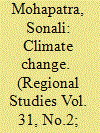

|
|
|
| 2 |
ID:
044246
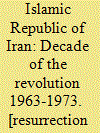

|
|
|
|
|
| Publication |
Iran, Islamic Republic of Iran., 1973.
|
| Description |
198p.pbk
|
|
|
|
|
|
|
|
|
|
|
|
Copies: C:1/I:0,R:0,Q:0
Circulation
| Accession# | Call# | Current Location | Status | Policy | Location |
| 010662 | 955.053/IRA 010662 | Main | On Shelf | General | |
|
|
|
|
| 3 |
ID:
160221
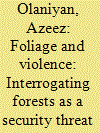

|
|
|
|
|
| Summary/Abstract |
The discourse on security challenges in Nigeria has generated much scholarly insight. What is yet to be sufficiently interrogated is the place of forests in the problem. Situating the problem within the context of global occurrences, the study explores security threats posed by the poor management of some Nigerian forests, which has resulted in invasion and exploitation by criminals who engage in militancy, kidnapping, ritual killing, armed robbery, cattle rustling and cannabis cultivation. Using the theory of ungoverned spaces as a foundation, the study locates the major reason for the invasion and use of forested landscape for criminal activities in the Nigerian state, the presence of the authorities in these sanctuaries is either non-existent or, at best, sporadic.
|
|
|
|
|
|
|
|
|
|
|
|
|
|
|
|
| 4 |
ID:
190731
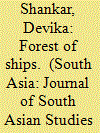

|
|
|
|
|
| Summary/Abstract |
This paper examines how the annexation of Malabar by the English East India Company in the last decade of the eighteenth century allowed the colonial administration to experiment with novel forms of state control in the region’s forests. At the same time, through a focus on the connections forged between Malabar’s forests and Bombay’s dockyards, this paper will use archival sources to examine the crucial role played by the timber monopoly introduced in 1806 in dislodging Malabar and its ports from their central position in the Indian Ocean economy and facilitating their incorporation into the margins of the emerging colonial economy.
|
|
|
|
|
|
|
|
|
|
|
|
|
|
|
|
| 5 |
ID:
171740
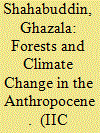

|
|
|
| 6 |
ID:
078231
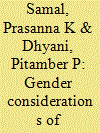

|
|
|
|
|
| Publication |
2007.
|
| Summary/Abstract |
Agriculture in the Indian Central Himalaya as an integrated resource system, being mainly dependent on forests and livestock, is also absolutely dependent on the input of women. The article shows that women have greater access to the major primary productive resources in the region and shoulder the responsibility of rationally managing and conserving these resources. Food production, cattle care and other routine household activities demand that women often work more than 15 hours per day. This onerous shouldering of various responsibilities by women, to some extent an outcome of geo-cultural specificities that impact on gender division of labour, creates much drudgery. The article discusses the critical role of women in the use and conservation of forests, livestock and agriculture generally, identifying technologies and strategies to be adopted to conserve and improve these resources and their productivity, while simultaneously ameliorating the quality of life for women in this mountainous ecosystem
|
|
|
|
|
|
|
|
|
|
|
|
|
|
|
|
| 7 |
ID:
193306
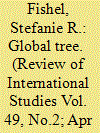

|
|
|
|
|
| Summary/Abstract |
Forest ecosystems are crucial to survival on Earth. This article argues that trees and forests are both vital components of a healthy Earth system and productive examples for expanding International Relations’ disciplinary boundaries. The article discusses the forest in three contexts: the global, the (post)colonial, and from the tree itself. From tree planting as a practice of social and environmental justice, to postcolonial and Indigenous science and knowledge, to the mycorrhizal ‘wood wide web’, a focus on trees, forests, and biosphere opens the possibility for a multispecies IR. Through a consideration of trees and forests in law, treaty, culture, and science at the local and global level, this article adds to a growing literature in IR that strives to bring the non-human, more-than-human, or other-than-human creatively and productively into the discipline. Foregrounding the forest's materiality and trees’ symbolic power for human cultures opens important pathways to understanding how the non-human is, and should, alter and affect global politics.
|
|
|
|
|
|
|
|
|
|
|
|
|
|
|
|
| 8 |
ID:
116691


|
|
|
|
|
| Publication |
2012.
|
| Summary/Abstract |
This article examines the energy transition in the iron industry and studies the consequence of this switch to coal-fueling technology upon forests: what happens to long-lived energy carriers when a new source of heat and power makes significant inroads into their own markets? What factors underpin the substitution of older raw materials by new ones? The major lesson to be drawn from the iron industry energy transition points to the fact that within the "transitional" time-frame one may expect either the effective substitution of the older energy carrier or incentives to its actual expansion.
|
|
|
|
|
|
|
|
|
|
|
|
|
|
|
|
| 9 |
ID:
153886


|
|
|
|
|
| Summary/Abstract |
The participation of non-state actors in international politics has been investigated since the creation of international institutions. Yet, the rules, principles and norms of global governance are no longer discussed in single isolated institutions. Rather, with the proliferation of international regimes and organizations, international issues are now negotiated in a context of institutional interactions known as ‘regime complexes’. This poses new questions, in particular on the negotiation burden that these new processes place on international actors. To answer this question, this contribution compares non-state participation in both contexts (single regimes and regime complexes), using the international forest negotiations as a case study. It uses quantitative methods to measure the negotiation burden of single regimes and compare it with the negotiation burden of regime complexes. The negotiation burden of single regimes is found to be insignificant, political interest being the major motivation for participation, while the negotiation burden of regime complexes is found to be real, demanding a certain type of material and organizational resources in order for non-state actors to participate. Yet a certain diversity of non-state representation is maintained within regime complexes, non-governmental organizations being dominant with respect to business groups.
|
|
|
|
|
|
|
|
|
|
|
|
|
|
|
|
| 10 |
ID:
144757
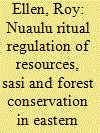

|
|
|
|
|
| Summary/Abstract |
Nuaulu (Seram, Maluku, Indonesia) manage forest to provision sacred house building and ritual feasting through a system of protected areas (sin wesie), examined here in relation to sasi institutions and scare charms (matakau) that overlap in their functions. Sasi feature in wider debates about how customary practices might deliver conservation objectives. The paper analyses interconnections between these three forms of regulation in the context of deforestation, social change and the recent history of state management interventions.
|
|
|
|
|
|
|
|
|
|
|
|
|
|
|
|
| 11 |
ID:
132951


|
|
|
|
|
| Publication |
2014.
|
| Summary/Abstract |
China's relatively recent dramatic increase in forest area has been hailed domestically and globally as one of the world's few environmental success stories, but significant problems remain in China's reforestation efforts. We describe the challenges that China still faces if it is to meet its laudable - but sometimes contradictory - goals for its forest sector: improving rural livelihoods, sustaining and restoring ecosystem services, and increasing output of the forest product-dependent manufacturing and construction sectors. We do so while pointing out the unintended consequences of implementing these policy goals: overstatement of the quantity and quality of the forest recovery, domestic human and ecological costs of the reforestation, and externalization of China's continually growing demand for timber and forest products in the form of increased imports from vulnerable forests in other parts of the world.
|
|
|
|
|
|
|
|
|
|
|
|
|
|
|
|
| 12 |
ID:
076461
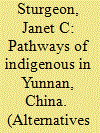

|
|
|
| 13 |
ID:
080813
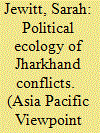

|
|
|
|
|
| Publication |
2008.
|
| Summary/Abstract |
Although India's Jharkhand movement resists classification as either an ethnic or an environmental movement, it has, at different times, mobilised clear elements of both with frequently violent outcomes. This paper examines the movement from a political ecology perspective and focuses on violence arising from natural resource-related grievances, notably land alienation, forest policy and employment from Jharkhand's mines. Drawing from political ecology's emphasis on the need to examine conflict from a range of different spatial scales, the paper emphasises the importance of a micro-political ecology approach for understanding how locally based conflicts over natural resources can harden into more established grievances that can be mobilised politically as part of a wider and potentially violent protest movement. It is also suggested that micro-political ecology approaches can assist participatory resource management initiatives in ameliorating local conflicts over access to resources, thus helping to prevent them from escalating into more widespread violence.
|
|
|
|
|
|
|
|
|
|
|
|
|
|
|
|
| 14 |
ID:
137271
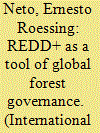

|
|
|
|
|
| Summary/Abstract |
Given the lack of a multilateral convention on forests, global deforestation is being addressed through various initiatives, public and private, local and global. Since 2005, the creation of a mechanism for addressing deforestation (among other things) has been moving forward within the United Nations Framework Convention on Climate Change (UNFCCC) regime. Known as REDD+, it is meant to provide incentives to developing countries in return for forest conservation, with the goal of reducing greenhouse gas emissions. REDD+ could lead to lower levels of deforestation and forest degradation, and to the incorporation of customary governance arrangements in national policy instruments, albeit with some risk of centralisation of forest governance. It could also have a negative social and environmental impact if too much emphasis is put on carbon without adopting the proper social and environmental safeguards.
|
|
|
|
|
|
|
|
|
|
|
|
|
|
|
|
| 15 |
ID:
161264
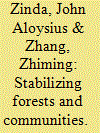

|
|
|
|
|
| Summary/Abstract |
China's recent collective forest tenure reform is intended to clarify and certify forest rights, and thereby promote market circulation of forestland, encourage forestry production and safeguard conservation. Central policy statements prioritize parcelling tenure among households to promote efficient management. This study examines how participants experienced the programme in communities in north-west Yunnan. In the study area, rather than individualizing tenure, forestry agencies compelled communities to re-collectivize forests. Nonetheless, residents persist in using household forests despite restrictions. Local officials tacitly sanction these activities. In mountain hinterlands, forest tenure reform has been focused on “stabilizing” forests and communities. Rather than forcibly impose tenure designs, authorities perform what we call accommodative buffering. A set of formal institutions, rules and mappings enables projects like forest ecological compensation payments to go forward. However, state agents at local and higher levels tolerate informal practices that contain the trouble that poorly fitted formal institutions might cause. While potentially more resilient than by-the-book enforcement, these arrangements could leave residents vulnerable to political shifts that require a demonstration of policy adherence.
|
|
|
|
|
|
|
|
|
|
|
|
|
|
|
|
| 16 |
ID:
076321
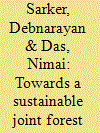

|
|
|
|
|
| Publication |
2006.
|
| Summary/Abstract |
This article demonstrates that the resistance movement of forest communities in western Midnapore division in West Bengal, which acted as a key precursor to the joint forest management (JFM) programmes in India through a June 1990 Ministry of Environment and Forests circular, was based to a large extent on the successful experience of JFM in Arabari Hills under this division. In this particular locality, the resistance movement of forest communities had been mobilized for a long time by poor forest communities fighting for their community rights to forest resources as a matter of immediate survival, opposing top-down approaches to forest management. A detailed study of the existing four Forest Protection Committees (FPCs) of this area confirms that these immediate survival needs, generating mainly sustenance and income from non-timber forest products (NTFPs) for FPC members, are the key element for the long-term sustainability of a JFM system.
|
|
|
|
|
|
|
|
|
|
|
|
|
|
|
|
| 17 |
ID:
170674
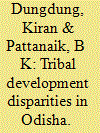

|
|
|
|
|
| Summary/Abstract |
The well-known phenomenon of tribal disadvantage in India requires constant monitoring to ensure diligent attention to equitable protection of tribal people’s right to life. This article, based on an analysis of primary data collected from 400 households in eight different tribal communities in Odisha, charts the differential progress of Odisha tribals by establishing a Tribal Development Index. Such data identify significant development disparities and confirm the existence of a ‘creamy layer’, constituted of more developed individuals and families also among India’s tribals. While many households in these eight communities still lack basic amenities, notable differences regarding food security, landholding, income and overall development were identified, supporting arguments for devising more sophisticated differential forms of intervention.
|
|
|
|
|
|
|
|
|
|
|
|
|
|
|
|
| 18 |
ID:
080583
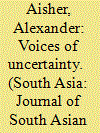

|
|
|
|
|
| Publication |
2007.
|
| Summary/Abstract |
Large-scale deforestation in the upper catchments of the Brahmaputra River represents a key anthropogenic factor at work in the landslides and floods that regularly impact upon Northeast India. For this reason, the conservation of forests in Arunachal Pradesh is of regional significance. Based upon fieldwork conducted with clans of the Nyishi tribe inhabiting the remote uplands of Arunachal Pradesh in 2002-2003, this paper argues that 'spirits', or uyu, are at the heart of local perceptions of forests. Drawing upon recent ecological models that stress the centrality of uncertainty, indeterminacy and surprise to the modelling of ecological dynamics, and the need to be sensitive to the interaction of structural features of human agency across a range of scales, this paper argues that the character and activity of such spirits not only reflect the susceptibility of the landscape to human disturbance, but also the uncertainties underpinning human economic interactions with a fragile and capricious mountain ecosystem. Through spirits, the human extraction of forest-related resources during hunting and shifting cultivation manifests as forms of exchange between humans and spirits. From within this cosmology, the rapid depopulation of many villages in upland Arunachal Pradesh in the present day, and the regeneration of forests around such villages, manifest as an increase of spirit-wealth. The paper concludes that in upland Arunachal Pradesh attention to 'spirits', or uyu, may indeed serve to foreground uncertainty, indeterminacy, surprise and other key ecological dynamics.
This paper is based on doctoral research carried out in Arunachal Pradesh in 2002-2003. This, the first detailed ethnographic study of Nyishi communities inhabiting the remote upland district of Kurung Kumey, was made possible through the guidance, assistance and support of many people within the Nyishi tribe
|
|
|
|
|
|
|
|
|
|
|
|
|
|
|
|
| 19 |
ID:
193311


|
|
|
|
|
| Summary/Abstract |
Forests, and ways of relating to forests, are critical to the planet, yet largely neglected in IR. In this article, we engage with the debate on the Anthropocene and explore different forms of relationality to forests and Amazonian indigenous symbolism. Drawing mainly on political sociology, political ecology, and anthropology, we approach the Amazon basin as a site where nature, culture, resource extraction, and spirituality are enmeshed, and discuss material and symbolic meanings of the forest. The article starts by briefly reviewing discourses around the Anthropocene. It then looks at Amazonian countries with a specific focus on the classist foundations of socioecological exploitation that underpin anthropocentric attitudes and practices, and analyses the material way of perceiving the Amazon. It proceeds by addressing the diverse symbolism present in indigenous traditional knowledge; symbolism that may help in moving politics and society beyond the dominant attitudes that initiated the Anthropocene. Finally, the article offers possibilities for perceiving the forest differently and intertwining the Amazon's material and symbolic worlds.
|
|
|
|
|
|
|
|
|
|
|
|
|
|
|
|
|
|
|
|
|